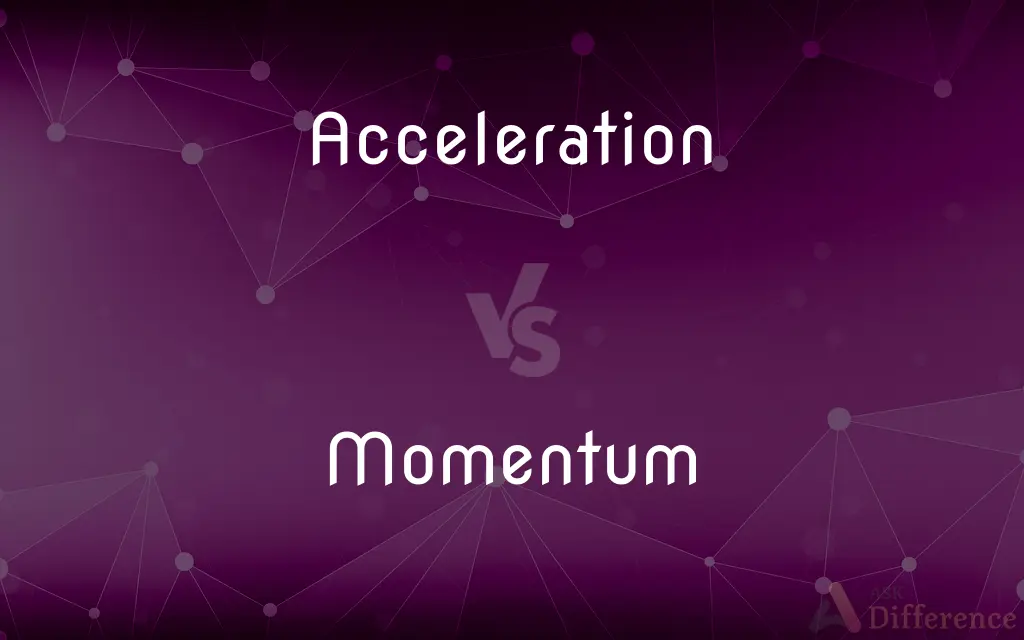Acceleration vs. Momentum — What's the Difference?
Edited by Tayyaba Rehman — By Fiza Rafique — Updated on October 5, 2023
Acceleration refers to the rate of change of velocity per unit time, while Momentum is the product of an object's mass and velocity.

Difference Between Acceleration and Momentum
Table of Contents
ADVERTISEMENT
Key Differences
Acceleration articulates how quickly an object is speeding up or slowing down, representing a vector quantity, meaning it has both magnitude and direction. In contrast, Momentum combines mass and velocity, establishing an object’s capability to keep moving in a specific direction.
Momentum defines an object's inertia in motion, a scalar product of its mass and velocity, which essentially portrays how hard it is to stop a moving object. Whereas, Acceleration is fundamentally about change, concerning how fast an object’s velocity alters with respect to time, always pointing in the direction in which the object is accelerating.
Elaborating on Acceleration, it is the derivative of velocity concerning time and is depicted mathematically as a = (v_f - v_i)/t, where v_f and v_i are the final and initial velocities respectively, and t is the time. Momentum, on the flip side, is expressed with p = mv, where p represents momentum, m indicates mass, and v stands for velocity.
Furthermore, Acceleration could result from either a change in the magnitude or direction of the velocity vector. Even if the object is moving at a constant speed, if it's changing direction, it is accelerating. In the physical world, Momentum illustrates an object's impetus and is conserved in isolated systems, demonstrating the principle of conservation of momentum.
Lastly, Acceleration finds application in various scientific domains, playing a pivotal role in kinematics, while Momentum, anchored in Newton’s laws of motion, elucidates phenomena in physics from atomic particles to celestial bodies, embodying the vitality of motion in physics.
ADVERTISEMENT
Comparison Chart
Definition
Rate of change of velocity
Product of mass and velocity
Representation
Vector (has direction and magnitude)
Vector (directed mass-velocity product)
Formula
A=(vf −vi)/t
P=mv
Dependency
Depends on change in velocity and time
Depends on object’s mass and velocity
Conservation
Not conserved
Conserved in closed systems
Compare with Definitions
Acceleration
A vector quantity showing speed change.
He measured the acceleration due to gravity.
Momentum
Mass multiplied by velocity.
A moving train has significant momentum.
Acceleration
An increase or decrease in speed.
The roller coaster's acceleration thrilled the riders.
Momentum
The difficulty of stopping a moving object.
The momentum of the bus was too great to halt abruptly.
Acceleration
Change in velocity over time.
The car showed remarkable acceleration when overtaking.
Momentum
A vector quantity in the direction of velocity.
Conservation of momentum explains recoil of a gun.
Acceleration
The rate of velocity alteration.
Acceleration is zero when the velocity is constant.
Momentum
In Newtonian mechanics, linear momentum, translational momentum, or simply momentum (pl. momenta) is the product of the mass and velocity of an object.
Acceleration
In mechanics, acceleration is the rate of change of the velocity of an object with respect to time. Accelerations are vector quantities (in that they have magnitude and direction).
Momentum
Symbol p(Physics) A quantity used to measure the motion of a body, equal to the product of the body's mass and its velocity. Also called linear momentum.
Acceleration
The act of accelerating.
Momentum
The force or energy exhibited by a moving body
The ball did not have enough momentum to reach the goalposts.
Acceleration
The process of being accelerated.
Momentum
The driving force or advancing strength of a development or course of events
The effort to reform public education has been gaining momentum.
Acceleration
Abbr. a(Physics) The rate of change of velocity with respect to time.
Momentum
(Philosophy) An essential or constituent element; a moment.
Acceleration
(uncountable) The act of accelerating, or the state of being accelerated; increase of motion or action; as opposed to retardation or deceleration.
A falling body moves toward the earth with an acceleration of velocity
Momentum
(physics) Of a body in motion: the tendency of a body to maintain its inertial motion; the product of its mass and velocity, or the vector sum of the products of its masses and velocities.
Acceleration
(countable) The amount by which a speed or velocity increases (and so a scalar quantity or a vector quantity).
The boosters produce an acceleration of 20 metres per second per second.
Momentum
The impetus, either of a body in motion, or of an idea or course of events; a moment.
Acceleration
(physics) The change of velocity with respect to time (can include deceleration or changing direction).
Momentum
The quantity of motion in a moving body, being always proportioned to the quantity of matter multiplied by the velocity; impetus.
Acceleration
The advancement of students at a rate that places them ahead of where they would be in the regular school curriculum.
Momentum
Essential element, or constituent element.
I shall state the several momenta of the distinction in separate propositions.
Acceleration
The act of accelerating, or the state of being accelerated; increase of motion or action; as, a falling body moves toward the earth with an acceleration of velocity; - opposed to retardation.
A period of social improvement, or of intellectual advancement, contains within itself a principle of acceleration.
Momentum
A property of an activity or course of events, viewed as analogous to forward motion or to physical momentum (def. 1), such that the activity is believed to be able to continue moving forward without further application of force or effort; - often used to describe an increase in the acquisition of public support for a purpose; as, as, the petition drive gained momentum when it was mentioned in the newspapers.
Acceleration
An increase in speed;
Modern science caused an acceleration of cultural change
Momentum
An impelling force or strength;
The car's momentum carried it off the road
Acceleration
The act of accelerating; increasing the speed
Momentum
The product of a body's mass and its velocity;
The momentum of the particles was deduced from meteoritic velocities
Acceleration
(physics) a rate of change of velocity
Momentum
Inertia in motion.
The skater’s momentum carried them forward.
Acceleration
The derivative of velocity regarding time.
The particle’s acceleration was calculated using calculus.
Momentum
Physical quantity related to motion.
Colliding balls exchange momentum.
Common Curiosities
Can an object moving at a constant speed have acceleration?
If an object is changing its direction but not its speed (like in circular motion), it can still have acceleration.
How is acceleration measured?
It's typically measured in meters per second squared (m/s^2) or feet per second squared (ft/s^2).
How is momentum different from velocity?
Velocity is a vector describing an object's speed and direction, while momentum is a measure of how difficult it is to stop that moving object.
What is acceleration?
Acceleration is the rate of change of velocity of an object with respect to time.
What causes acceleration in objects?
Acceleration is caused by forces acting on an object, according to Newton's second law of motion.
Do all objects with momentum have kinetic energy?
Yes. Any object with momentum (i.e., moving) has kinetic energy. However, the formulas and relationships differ.
Is acceleration only about speeding up?
No. Acceleration can refer to speeding up, slowing down (deceleration), or changing direction.
How do car airbags relate to momentum?
Airbags increase the time over which a collision occurs, reducing the rate of change of momentum and thus the force experienced by occupants.
How is momentum measured?
Momentum (p) is typically measured in kilogram meters per second (kg·m/s) and is a vector quantity.
Can a stationary object have momentum?
No. If an object is stationary (velocity is zero), its momentum is also zero.
Can an object have momentum without acceleration?
Yes. An object moving at a constant velocity has momentum but no acceleration.
What is momentum?
Momentum is the product of an object's mass and velocity and represents the quantity of motion an object has.
Is momentum always conserved?
Yes, in a closed system without external forces, momentum is conserved. This is known as the conservation of momentum.
How are momentum and acceleration related?
According to Newton's second law, the net force (which causes acceleration) acting on an object is equal to the rate of change of its momentum.
If two objects have the same acceleration, do they have the same momentum?
Not necessarily. Momentum is dependent on both velocity and mass, while acceleration is just the rate of change of velocity. Two objects can have the same acceleration but different momenta due to differences in mass or initial velocity.
Share Your Discovery

Previous Comparison
Forever vs. Infinity
Next Comparison
Discord vs. DiscourseAuthor Spotlight
Written by
Fiza RafiqueFiza Rafique is a skilled content writer at AskDifference.com, where she meticulously refines and enhances written pieces. Drawing from her vast editorial expertise, Fiza ensures clarity, accuracy, and precision in every article. Passionate about language, she continually seeks to elevate the quality of content for readers worldwide.
Edited by
Tayyaba RehmanTayyaba Rehman is a distinguished writer, currently serving as a primary contributor to askdifference.com. As a researcher in semantics and etymology, Tayyaba's passion for the complexity of languages and their distinctions has found a perfect home on the platform. Tayyaba delves into the intricacies of language, distinguishing between commonly confused words and phrases, thereby providing clarity for readers worldwide.














































